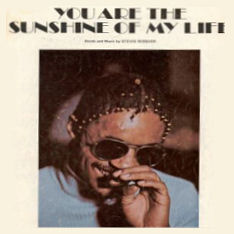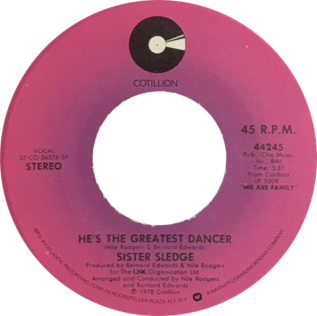
"Let the Music Play" is a song recorded by American singer Shannon and released on September 19, 1983, as both her debut single and the lead single from her 1984 debut studio album of the same name. Written by Chris Barbosa and Ed Chisolm, and produced by Barbosa and Mark Liggett, "Let the Music Play" was the first of Shannon's four number ones on the US Dance Club Songs chart, reaching the top spot in October 1983. It also became a huge crossover hit in the US, peaking at number two on the Hot R&B/Hip-Hop Songs chart and number eight on the Billboard Hot 100 in February 1984. It was Shannon's only top 40 hit in the US. Some mark "Let the Music Play" as the beginning of the "dance-pop" era. "Let the Music Play" was ranked 43rd on the 2009 VH1 Special 100 Greatest One-Hit Wonders of the 1980s, while Rolling Stone and Billboard featured it in their lists of "200 Greatest Dance Songs of All Time" and "500 Best Pop Songs of All Time" in 2022 and 2023, respectively. The song also appears in the film Totally Killer and the video games Dance Central 3 and Scarface: The World Is Yours.
All Platinum Records was a record company started in 1967 by singer/writer/producer Sylvia Robinson and her husband, businessman Joe Robinson, who had previously worked in the recording industry.

"I'm Every Woman" is a song by American singer Chaka Khan, released in September 1978 by Warner Bros. as her debut solo single from her first album, Chaka (1978). It was Khan's first hit outside her recordings with the funk band Rufus. "I'm Every Woman" was produced by Arif Mardin and written by the successful songwriting team Nickolas Ashford and Valerie Simpson. The single established Chaka's career outside the group Rufus, whom she would leave after their eighth studio album, Masterjam, was released in late 1979.

"Ring My Bell" is a 1979 disco song written by Frederick Knight. The song was originally written for eleven-year-old Stacy Lattisaw as a teenybopper song about children talking on the telephone. When Lattisaw signed with a different label, American singer and musician Anita Ward was asked to sing it instead, and it became her only major hit.

"Handy Man" is a song written by singer Jimmy Jones and songwriter Otis Blackwell. Recordings by Del Shannon and also The Sparks Of Rhythm list Charles Merenstein as a co-writer, as does BMI. The Sparks Of Rhythm version on the Apollo 541 single version released in 1959 credits Andrew Barksdale and Merenstein as writers omitting Jimmy Jones. The song is noted for Jones singing "Come-a, come-a come-a come-a, come come-a, yeah" lyrics, which are heard at the beginning as well as in the coda of the song, before the song's fade.

"Sunshine on My Shoulders" is a song recorded and co-written by American singer-songwriter John Denver. It was originally released as an album track on 1971's Poems, Prayers & Promises and later, as a single in 1973. It went to No. 1 on the Billboard Hot 100 chart in the U.S. in early 1974.

"You Are the Sunshine of My Life" is a 1973 single released by Stevie Wonder. The song became Wonder's third number-one single on the Billboard Hot 100 chart and his first number-one on the Easy Listening chart. It won Wonder a Grammy Award for Best Male Pop Vocal Performance, and was nominated for both Record of the Year and Song of the Year. This song was the second single released from the 1972 album entitled Talking Book, which stayed at number one on the R&B albums chart for three weeks.

"Let's Hear It for the Boy" is a song by Deniece Williams that appeared on the soundtrack to the feature film Footloose. The song was released as a single from both the soundtrack and her album of the song's same name Columbia Records. It was written by Tom Snow and Dean Pitchford and produced by George Duke. The song became Williams' second number one on the US Billboard Hot 100 on May 26, 1984. It also topped Billboard's dance and R&B charts and on the Cash Box Top 100. It peaked at number two on the UK Singles Chart, behind "Wake Me Up Before You Go-Go" by Wham!. It was nominated for an Academy Award for Best Original Song at the 57th Academy Awards, and was certified platinum in the US and gold in Canada and the UK by the Recording Industry Association of America, Music Canada and the British Phonographic Industry, respectively. The music video was released in mid-April 1984. The song features background vocals from George Merrill and Shannon Rubicam, who would go on to form the duo Boy Meets Girl.

"Working My Way Back to You" is a song made popular by the Four Seasons in 1966 and the Spinners in 1980.

"Love's Theme" is an instrumental piece written by Barry White around 1965. Recorded and released as a single by White's Love Unlimited Orchestra in 1973, it was one of the few instrumental and purely orchestral singles to reach #1 on the Billboard Hot 100 chart in the United States, which it did in early 1974. Billboard ranked it as #3 on the Year-End Hot 100 singles of 1974.

"He's the Greatest Dancer" is a late 70s’ song by the American vocal group Sister Sledge. Released on February 3, 1979, the song was written and composed by Bernard Edwards and Nile Rodgers, and recorded for the group's successful 1979 album We Are Family. Billboard named the song No. 66 on its list of "100 Greatest Girl Group Songs of All Time."

"Soul Man" is a 1967 song written and composed by Isaac Hayes and David Porter, first successful as a number 2 hit single by Atlantic Records soul duo Sam & Dave, which consisted of Samuel "Sam" Moore and David "Dave" Prater. In 2019, "Soul Man" was selected for preservation in the National Recording Registry as "culturally, historically, and aesthetically significant" by the Library of Congress. It was No. 463 in "Top 500 Greatest Songs of All Time" by Rolling Stone in 2010 and No. 458 in 2004.

"Shame" is the debut single by American singer Evelyn "Champagne" King, written by John H. Fitch Jr. and Reuben Cross. It was released in 1977 by RCA Records as part of King's debut album, Smooth Talk. The extended remix was produced for the twelve-inch vinyl single and would later replace the album version of the song in late-1970s reprints of the album. "Shame" was successful on Billboard music charts and would become one of King's signature songs, though it varied on international music charts. The song was covered by Zhané for the 1994 film A Low Down Dirty Shame and Kim Wilde in 1996.

"Do It ('Til You're Satisfied)" is a popular song by funk group B. T. Express, written by songwriter Billy Nichols.

"I'm Gonna Let My Heart Do the Walking" is a disco-styled soul single composed by the Holland brothers Eddie and Brian, members of the former Holland–Dozier–Holland team and was released as a single by Motown vocal group The Supremes in 1976 on the Motown label. It was the first single since "Your Heart Belongs to Me" in 1962 to feature four Supremes. It is also notable for being the last top forty single the group would score before they disbanded in 1977.

"Hold On, I'm Comin'" is a song first recorded in 1966 by soul duo Sam & Dave, issued in the same year on the Atlantic-distributed Stax label.

"One of a Kind (Love Affair)" is a song recorded by the American R&B vocal group The Spinners (known as "Detroit Spinners" in the UK). It was written by Joseph B. Jefferson and produced by Thom Bell.

"Never My Love" is a pop standard written by American siblings Don and Dick Addrisi, and best known from a hit 1967 recording by the Association. The Addrisi Brothers had two Top 40 hits as recording artists, but their biggest success as songwriters was "Never My Love". Recorded by dozens of notable artists in the decades since, in 1999 the music publishing rights organization Broadcast Music, Inc. (BMI) announced it was the second most-played song on radio and television of the 20th century in the U.S.
"Daddy's Home" is a famous song by American doo-wop group Shep and the Limelites. The song was written by the three members of the band, James "Shep" Sheppard (1935–1970), Clarence Bassett (1936–2005) and Charles Baskerville. The group recorded the original version of "Daddy's Home" on February 1, 1961, and it was released on Hull Records in March 1961 with the B-side being "This I Know".
"Hold Me Tight" is a song written and performed by Johnny Nash. It was featured on his 1968 album Hold Me Tight, was arranged by Arthur Jenkins and produced by Jenkins and Nash.

















